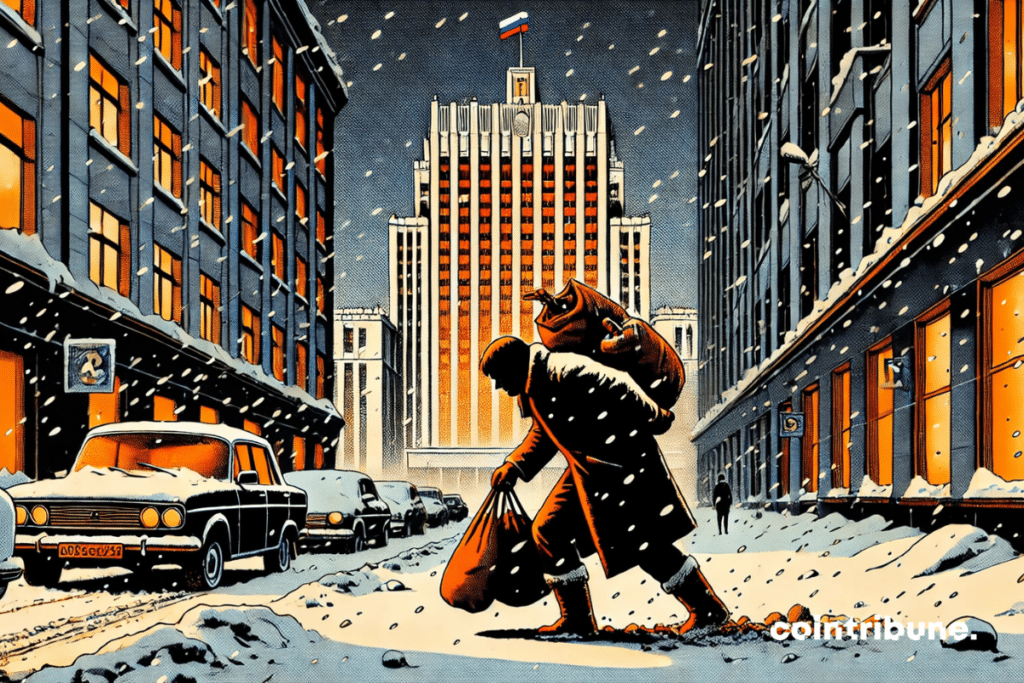Russia’s Central Bank Considers Unprecedented Rate Hike
The Russian economy is going through a period marked by strong tensions, enduring inflation, and economic challenges related to the war in Ukraine. In this context, the Central Bank of Russia (CBR) is contemplating a decision that could reshape the national economic landscape: a new increase in its key interest rate, already raised to 21 %, an unprecedented level in two decades. This measure aims to curb the rise in consumer prices, estimated at 8.5 %, which is double the official target.

Uncontrollable inflation : the reasons for a strict monetary policy
At the VTB Russia Calling financial forum, held in Moscow on December 4 and 5, 2024, Elvira Nabiullina, the governor of the Central Bank of Russia, confirmed that the institution was seriously considering raising the key interest rate again, despite it already being at 21 %. “We have indicated that the central bank is considering the possibility of a rate hike, as inflation has not yet started to decline,” she declared before an audience of economic experts. This announcement reflects the urgency of containing inflation currently reaching 8.5 %, which is twice the target set by authorities.
Such inflationary pressure is largely explained by the massive increase in military spending, directly linked to the conflict in Ukraine. This phenomenon has been reinforced by the recent adoption of the 2025-2027 budget, which foresees a 30 % rise in defense spending, reaching 13,500 billion rubles, or about 127 billion euros. In this context, the Central Bank is pursuing a strict monetary policy in order to reduce access to credit, aimed at slowing the price increase. The goal is to avoid a shift towards stagflation, a feared economic situation where high inflation and prolonged stagnation of growth combine.
However, this strategy raises concerns at the highest levels of state. Vladimir Putin has called for increased coordination among economic authorities to stabilize the situation. According to him, “acting collectively” is essential to limit the negative effects of these measures on the economy. As inflation continues to erode households’ purchasing power and companies are worried about rising borrowing costs, the Central Bank faces a complex equation, blending monetary discipline imperatives and the preservation of economic activity.
The flip side : economic tensions and uncertain prospects
The Central Bank of Russia maintains a strict monetary policy to control inflation, but this strategy deeply worries businesses. They lament a credit cost already described as “exorbitant,” which limits investments and could compromise the economic recovery expected in 2025. Furthermore, this brake on economic activity is even more critical as the authorities’ projections already anticipate a significant slowdown in growth next year.
At the same time, the situation is exacerbated by the significant weakness of the ruble, whose devaluation considerably increases the cost of imports. This additional pressure on prices fuels a vicious inflationary circle, affecting both consumers and businesses. The ruble remains under pressure due to several factors: new Western sanctions, particularly those targeting Gazprombank, the main financial institution used for energy payments, as well as a weakened confidence among international investors. This loss of monetary value also amplifies the Russian economy’s dependence on its raw material exports, which nonetheless benefit from a weakened currency.
Beyond the national economy, the implications of these monetary decisions affect Russia’s strategic position on the international stage. Geopolitical tensions, combined with financial sanctions, heighten uncertainty for foreign investors. In the medium term, Russia may be compelled to strengthen its dependence on its Asian partners, notably China and India, to counteract the effects of Western economic restrictions. This reorientation could durably reshape the Russian economy, but at the cost of new vulnerabilities, particularly in terms of financial autonomy.
Russia stands at a crucial economic crossroads. Stabilizing a weakened economy by exponential inflation while also preserving the competitiveness of businesses presents a complex challenge. Thus, if the Central Bank succeeds in containing inflation, it will strengthen its credibility and contribute to the stabilization of public finances. However, this strategy could hinder economic growth, already threatened by high borrowing costs and a weakened ruble, and widen inequalities between businesses and households. The decisive meeting scheduled for December 20 will play a vital role, as its decisions will shape the economic future of a country seeking balance amidst increasing domestic and international pressures.
Maximize your Cointribune experience with our "Read to Earn" program! For every article you read, earn points and access exclusive rewards. Sign up now and start earning benefits.
Diplômé de Sciences Po Toulouse et titulaire d'une certification consultant blockchain délivrée par Alyra, j'ai rejoint l'aventure Cointribune en 2019. Convaincu du potentiel de la blockchain pour transformer de nombreux secteurs de l'économie, j'ai pris l'engagement de sensibiliser et d'informer le grand public sur cet écosystème en constante évolution. Mon objectif est de permettre à chacun de mieux comprendre la blockchain et de saisir les opportunités qu'elle offre. Je m'efforce chaque jour de fournir une analyse objective de l'actualité, de décrypter les tendances du marché, de relayer les dernières innovations technologiques et de mettre en perspective les enjeux économiques et sociétaux de cette révolution en marche.
The views, thoughts, and opinions expressed in this article belong solely to the author, and should not be taken as investment advice. Do your own research before taking any investment decisions.